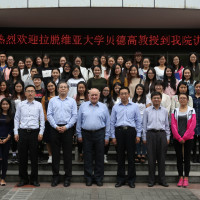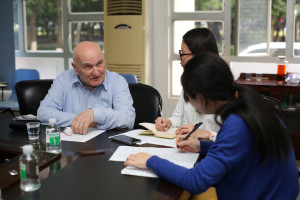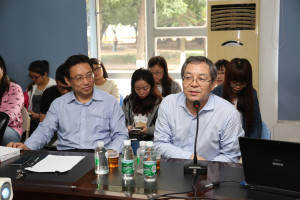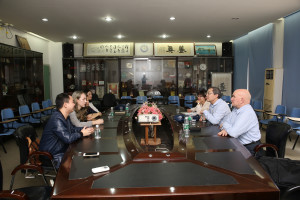China, My Second Hometown – the Deep Feeling from an Old Sinologist

“In 1949, I was eleven years old. One day, my father took a map to me and told me that there was a new country called the People’s Republic of China. How I could never imagine that I had built up a so deep relationship with China for over 50 years, from then China became my second hometown.” At this the man, the famous Latvian Sinologist, the director of Confucius Institute at the University of Latvia, with his eyes red, almost burst into tears
On December 13th, at the International Chinese Forum held by the College of International Cultural of South China Normal University, Prof. Pildegovičs, the director of Confucius Institute at the University of Latvia, talked about his deep relationship with China, and the process of engaging in Chinese teaching and sinology research and the story of the exchange between Latvia and China. In addition, the Chinese director of the Confucius Institute at the University of Latvia Professor Shang Quanyu, the College of International Cultural Professor Zuo Pengjun and many students attended this forum.
After graduating from the Department of Oriental Linguistics at the Moscow University, Prof. Pildegovičs had been a Chinese teacher at Latvian high school and the University of Latvia, and later worked as a journalist in Xinhua News Agency. He also served as the first charge d’affaires of the Latvian Embassy in China, the Secretary for Asia and Africa Division. He served as diverse duties,, but the title has never left a center – Chinese. During his tenure as a journalist at Xinhua Agency, Prof. Pildegovičs had to deal with and translated 25-30 articles every day, covering a wide range of topics including agriculture, medicine, economics and people’s livelihood. Based on a large collection of corpus, Prof. Pildegovičs wrote a 300-page dictionary. With the increasing exchange between Latvia and China, the number of people learning Chinese in Latvia is increasing. After returning to Latvia, he found students suffering from local Chinese learning because they can still only use Russian-Chinese dictionaries to access unknown words. With his hard work, the “Chinese Latvian Dictionary” was born eight years later.
2016 is harvest year for Prof. Pildegovičs. There were three things which worth celebrating. Firstly, on August 23rd, Prof. Pildegovičs won the Extraordinary Contributions Award of the World’s best book which was awarded by Vice Premier Liu Yandong. Only a dozen professors around the world can obtain this award. Secondly, on November 5th, Central and Eastern Europe 16 + 1 government leaders summit was held in Riga, Premier Li Keqiang granted an interview to Prof. Pildegovičs and accepted the “Chinese Latvian dictionary” gave by Prof. Pildegovičs. At the ceremony, Prof. Pildegovičs said. “Thank you very much for your kind attention, Premier Li Keqiang, and this is the Chinese-language Latvian dictionary I have prepared for you as a small gift.” Premier Li Keqiang was very moved, and he said. “This is a heavy gift, a bridge between China and Latvia.” Thirdly, at the 11th Confucius Institute Conference held in mid-December in Yunnan, he won the advanced individual title of the Confucius Institute.
In the afternoon, Prof. Pildegovičs also met with Latvian students and returning volunteers who had worked in the Confucius Institute in Latvia and chatted with them. They talked about previous interesting work, the development and introduction of current work, and prospects for future work. He also encouraged Latvian students who study in China to cherish the opportunity to come to China, actively integrate into the local environment and learn Chinese well.
Professor Pildegovičs’s feeling about China started in 1949. It was more than fifty years if it counted from his systematically learning of Chinese. From an eleven-year-old boy who didn’t know about China at all to a famous Sinologist around the world, he always on his way with patience and persistence in Sinology research and extension. As he said, “Although I’m nearly eighty years old, I definitely won’t be a retired cadre playing mahjong, I will continue to contribute myself to the exchange of Chinese culture.”



